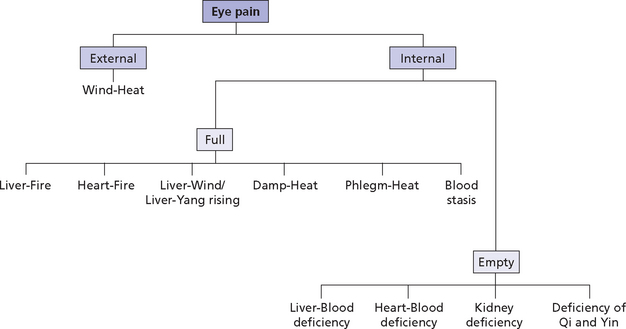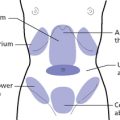 EARS AND EYES
EARS AND EYES
HOW WE ASK
In general terms, the ears may be affected by a pathology of Deficiency (usually of the Kidneys but also of Lung and Heart) causing tinnitus, hardness of hearing or deafness, or by one of Fullness, usually due to Heat or Phlegm.
The main deficiency patterns affecting the ear are:
The main Full patterns affecting the ears are:
Tinnitus
Symptoms and Signs, Chapter 57
Case history 42.1 illustrates a pattern of tinnitus caused by Yin deficiency.
Box 42.1 summarizes the patterns underlying tinnitus.
EYES
The Heart influences the eyes as both its Main and Connecting channels go to the eyeballs (see Fig 6.1 on p. 77). For this reason, many eye problems are due to Heart-Heat deriving from emotional problems.
WHY WE ASK
The questions regarding the eyes are somewhat more important than those regarding the ears, first because eye problems are more common and secondly because some eye symptoms often clinch a diagnosis. For example, the symptom of dry eyes often clinches the diagnosis of Liver-Yin deficiency (although it may also be caused by Kidney-Yin deficiency).
HOW WE ASK
Eye pain
Symptoms and Signs, Chapter 61
Full or Empty character of eye pain
Table 42.1 and Figure 42.1 summarize the Full and Empty characteristics of eye pain.
Table 42.1
Full and Empty characteristics of eye pain
| Full/Yang | Empty/Yin | |
| Onset | Sudden | Gradual |
| Time | Day | Night |
| Time of day | Morning | Afternoon |
| Constancy | Chronic and persistent | Chronic on and off |
| Swelling | With swelling | Without swelling |
| Intensity | Severe, unbearable | Dull, mild |
| Inflammation | Inflamed, red and hot | Not red, not hot |
| Pressure | Worse with pressure | Better with pressure |
| Temperature | Worse with heat, better with cold | Worse with cold, better with heat |
| Irritability | Pain with irritability (Liver) | Pain without irritability (Yang deficiency) |
| Character of pain | Pain like needles | Mild pain |
| Food | Worse after eating | Better after eating, worse when hungry |
| Two excretions (urination and defecation) | Redness, excretions affected | No redness, excretions not affected |
| Eyeball movement | With moving eyeballs | Eyeballs not moving |

Fig. 42.1 Differentiation of eye pain
Eye pain of internal or external origin
Eye pain can first be differentiated into internal and external types (Fig 42.1); secondly internal eye pain can be differentiated into Full and Empty as indicated in Table 42.1.
Eye pain of external origin is mostly due to invasion of Wind-Heat and is characterized by a sudden onset, sticky eyelids and streaming eyes, with an aversion to cold and a fever.
Eye pain from a Full condition is often accompanied by swelling and redness.
Box 42.5 summarizes the patterns underlying eye pain.
Streaming eyes
Observation, Chapter 6; Symptoms and Signs, Chapter 61
Box 42.7 summarizes the patterns underlying streaming eyes.


